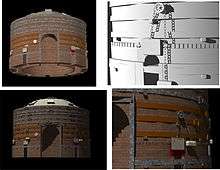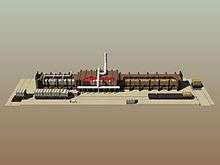Woodville, Derbyshire
| Woodville | |
 Woodville |
|
| Population | 3,420 (2001 census)[1] |
|---|---|
| OS grid reference | SK3119 |
| Civil parish | Woodville |
| District | South Derbyshire |
| Shire county | Derbyshire |
| Region | East Midlands |
| Country | England |
| Sovereign state | United Kingdom |
| Post town | Swadlincote |
| Postcode district | DE11 |
| Dialling code | 01283 |
| Police | Derbyshire |
| Fire | Derbyshire |
| Ambulance | East Midlands |
| EU Parliament | East Midlands |
| UK Parliament | South Derbyshire |
|
|
Coordinates: 52°46′08″N 1°31′59″W / 52.769°N 1.533°W
Woodville is a village and civil parish 1.5 miles east of Swadlincote in South Derbyshire, England. The population of the civil parish at the 2001 Census was 3,420 increasing to 5,161 at the 2011 Census.[2] The centre of the village, known as the Tollgate, is a busy traffic island on the A511. Woodville forms part of the border with Leicestershire.
History
Formerly known as Wooden Box, named after the wooden toll booth on the toll road between Ashby de la Zouch and Burton-upon-Trent. The area around the roundabout, which is the modern equivalent of the toll booth, is still known as 'Tollgate'. The name Woodville first appeared in a leaflet issued when the foundation stone of the Church of England parish church of Saint Stephen was laid on 7 November 1845.[3] St. Stephen's is a Norman revival building designed by H.I. Stevens and completed in 1846.[4]
The Woodville area is rich in industrial heritage with a wide variety of industries such as potteries, crate-making, pipe works, breweries, rope-making and railways all having had a presence in the area which is now either totally gone or extremely diminished.[5]
One of the most famous Woodville potteries was Bretby Art Pottery founded in 1882 by Henry Tooth and William Ault.
Local Geography
On some approaches it is difficult to tell where the village starts and ends as it is well incorporated into the urban sprawl of the surrounding towns and villages, including Midway and Swadlincote.
On the northern edge of Woodville is the Goseley Estate, which was constructed during the 1950s. There has been much development of the surrounding area with large private estates of new homes having been constructed.
To the south of Woodville, along the county border with Leicestershire, a large community of new houses is being developed (unofficially referred to as Woodville Woodlands) by the developers Bloor Homes[6] and Bryant Homes.[7] This development is built on the land of the former Woodville Pipe Works and incorporates the planting of new trees on the former fire clay pit as part of the National Forest scheme.[8]
The Mount Pleasant works operated by John Knowles & Company, demolished in 1993, produced pottery and has been replaced by a housing development. A discovery by archaeologists led to the preservation of some of its records.[9]
Amenities
Woodville High Street (which is part of the A511 road) has a small shopping area incorporating a convenience store, a pharmacy and a fish and chip shop. Also located on the High Street side of the road are additional food outlets, including a Chinese takeaway, a further fish and chip shop, and Indian and Chinese restaurants.
There is a village Post Office together with further shops and light industrial and commercial units.
Woodville has a 24-hour petrol station, incorporating a convenience store, and a tyre and exhaust centre which is located on the Tollgate roundabout.
Woodville has a Scout Group.[10]
Woodville has an Infant school and a Church of England Junior School.[11] Both schools are off the High Street.
Woodville Rangers Football Club was founded in 2005 and caters for all age groups from four to adult. Their nickname is The Tollers after the famous toll gate which was situated in Woodville for many years. The club badge shows the toll house.
Woodville Rangers gained FA Charter Standard status early in 2008.[12]
Notable residents
- John Hurt, the actor, lived in Woodville for seven years (1945–1952) from the ages of five to twelve. His father was the vicar of St. Stephen's parish church.
Industrial Heritage
- Mount Pleasant Pipeworks
 Woodville Beehive kiln, Archaeological Investigations LtdJohn Knowle's Mount Pleasant pipe-works at Woodville, Swadlincote was once a major employer in the area. It has now been demolished but before redevelopment the bases of a tunnel kiln and beehive kiln were excavated[13][14] Together with detailed records going back to the 19th century and photos preserved by ex-employees it has been possible to create detailed 3D reconstructions of the plant.
Woodville Beehive kiln, Archaeological Investigations LtdJohn Knowle's Mount Pleasant pipe-works at Woodville, Swadlincote was once a major employer in the area. It has now been demolished but before redevelopment the bases of a tunnel kiln and beehive kiln were excavated[13][14] Together with detailed records going back to the 19th century and photos preserved by ex-employees it has been possible to create detailed 3D reconstructions of the plant. Woodville Tunnel kiln, additional image at Archaeological Investigations Ltd
Woodville Tunnel kiln, additional image at Archaeological Investigations Ltd
The beehive kilns were down-draft kilns. In this case they had a double skin with fire holes around the external circumference and a main loading door. Counter weighted covers were used to open and close these openings. The heat would initially rise to the top of the kiln and then be forced down through the centre around the product, finally being vented below ground in tunnels to a chimney at the end of the group of kilns. The kilns were specifically designed for the production of salt glazed sewerage pipes. Their construction reflects this as the salt could be added to the fires and then distributed evenly across the product as vapour at a certain stage of firing.
The tunnel kiln produced 70% of the country's gas fire radiants (white ceramic grills that sit in the front of many domestic gas fires) in the mid 20th century and was difficult to visualise from the archaeological evidence alone. The digital reconstruction has assisted in understanding how the technology worked. The later design of the tunnel kiln enabled continuous firing thereby minimising delays while waiting for it to cool before loading and unloading. The product was slowly passed through a central chamber using gas to fire it.
References
- ↑ "Area selected: South Derbyshire (Non-Metropolitan District)". Neighbourhood Statistics: Full Dataset View. Office for National Statistics. Retrieved 30 September 2011.
- ↑ "Civil parish population 2011". Neighbourhood Statistrics. Office for National Statistics. Retrieved 2 April 2016.
- ↑ A Brief History of Knowles [John Knowles & Co (Wooden Box) Ltd], no date, page 3
- ↑ Pevsner, Nikolaus; Williamson, Elizabeth (1978) [1953]. Derbyshire. The Buildings of England. Harmondsworth: Penguin Books. p. 361. ISBN 0-14-071008-6.
- ↑ Local Heritage Initiative Website
- ↑ Bloor Homes development
- ↑ Bryant Homes: The Coppice
- ↑ The National Forest
- ↑ Archaeological report
- ↑ 1st Woodville (St Stephens) Scout Group
- ↑ Woodville Junior School
- ↑ Woodville Rangers F.C.
- ↑ Archaeological report
- ↑ Cradock-Bennett, L (2007) 'John Knowles & Co. Mount Pleasant Works, Woodville Woodlands', Hereford Archaeology Series – Archaeological Investigation and history of the works, ref 757, 969.
External links
![]() Media related to Woodville, Derbyshire at Wikimedia Commons
Media related to Woodville, Derbyshire at Wikimedia Commons